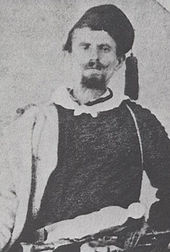- Dimitar Obshti
-
Dimitar Obshti (Bulgarian: Димитър Общи) was a 19th-century Bulgarian revolutionary, who fought for the liberation of Bulgaria, Serbia and Crete from the Ottoman Empire but also for the Risorgimento of Italy.
Obshti was born around 1835 in Đakovica, Kosovo, Ottoman Empire. He joined the first Bulgarian Legion organised in exile, in Serbia's capital Belgrade, in 1862.
There he received military training and met Vasil Levski who became his lifetime comrade in arms. They fought together against the invading Ottomans. After the Constantinople Conference the Serbian authorities disbanded the Bulgarian legion and expelled its participants from the country. Obshti subsequently joined the forces of the Italian revolutionary Giuseppe Garibaldi and took part in the 1866–1868 Cretan Uprising.[1] In 1869 he became one of the founders of the Bulgarian Revolutionary Central Committee (BRCC) in Bucharest, Romania.
In June 1871 Obshti was sent to Ottoman-occupied Bulgaria to serve as Levski's first deputy but compromised his superior's efforts by his adventurous endeavours. He led an assassination attempt against deacon Paisius, vicar to the bishop of Lovech, who was suspected of collaboration and treason. Against the opinion of Levski, in September 1872 Obshti organized the robbery of the Ottoman postal convoy in the Arabakonak Pass in order to fund the BRCC activities.[2] The Ottoman authorities reacted harshly and managed to arrest a number of BRCC militants, including Obshti and Levski.[3] Obshti grasped at the chance to publicize the BRCC activities in order to arouse the Great Powers' interest in liberating Bulgaria. He made some revealing statements in court which led to a great number of arrests and the effective ruin of the clandestine network. He was sentenced to death and hanged in Sofia on January 10, 1873. A month later, the same fate fell on Levski.
References
- ^ Todorov, Varban (1995). Greek Federalism During the Nineteenth Century: Ideas and Projects. Columbia University Press. pp. p. 73. ISBN 0880333057.
- ^ "BNR Radio Bulgaria History and Religion". www.bnr.bg. http://www.bnr.bg/RadioBulgaria/Emission_English/Theme_History_And_Religion/Material/Bgarib.htm. Retrieved 2008-05-12.
- ^ "VAGABOND — a magazine in English — Bulgarian National Revival by prof. Hristo Matanov". www.vagabond-bg.com. http://www.vagabond-bg.com/?page=live&sub=37&open_news=714. Retrieved 2008-05-12.
Categories:- 1835 births
- 1873 deaths
- People from Đakovica
- Bulgarian revolutionaries
- History of Bulgaria
- People executed by hanging
- 19th-century Bulgarian people
- 19th-century Serbian people
Wikimedia Foundation. 2010.

